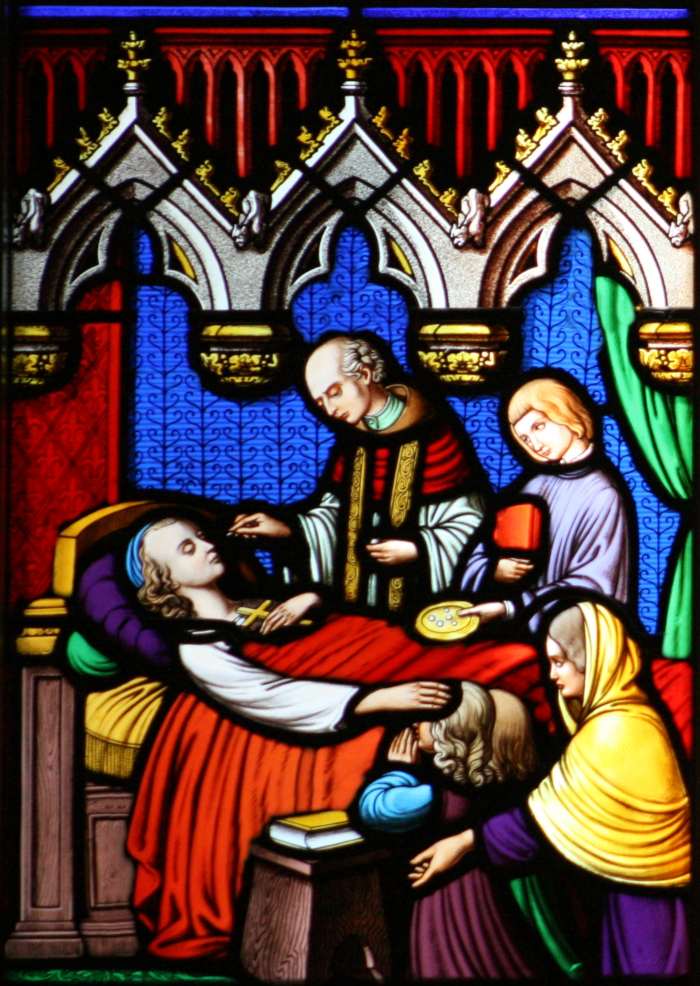Rev José Mario O Mandía
jmom.honlam.org
The CCC (no 1513) declares: “The Apostolic Constitution Sacram unctionem infirmorum (Paul VI, November 30, 1972), following upon the Second Vatican Council (cf Sacrosanctum Concilium 73), established that henceforth, in the Roman Rite, the following be observed: ‘The sacrament of Anointing of the Sick is given to those who are seriously ill by anointing them on the forehead and hands with duly blessed oil – pressed from olives or from other plants – saying, only once: “Through this holy anointing may the Lord in his love and mercy help you with the grace of the Holy Spirit. May the Lord who frees you from sin save you and raise you up” (cf Code of Canon Law, canon 847 # 1).’”
In the Eastern rite, other parts of the body are also anointed (cf CCC 1531).
The remote matter of this sacrament is olive oil or oil from other plants that has been blessed. The proximate matter is the anointing on the forehead and the hand.
The form, as mentioned above, is the prayer that is recited as the anointing is being done.
WHO IS THE MINISTER OF THIS SACRAMENT?
As we have seen above, Saint James (5:14-15) writes: “Is anyone among you sick? Let him call in the presbyters of the Church and let them pray over him and anoint him with oil in the name of the Lord.”
Not just anyone can anoint. The presbyters (priests) of the Church have to be called in. Thus, the CCC (1516) repeats this teaching:
“Only priests (bishops and presbyters) are ministers of the Anointing of the Sick (cf Council Of Trent (1551): DS 1697; 1719; Code of Canon Law, canon 1003; Code of Canons of the Oriental Churches, canon 739 # 1). It is the duty of pastors to instruct the faithful on the benefits of this sacrament. The faithful should encourage the sick to call for a priest to receive this sacrament. The sick should prepare themselves to receive it with good dispositions, assisted by their pastor and the whole ecclesial community, which is invited to surround the sick in a special way through their prayers and fraternal attention.”
WHAT KIND OF OIL IS USED?
Point 1530 of the CCC teaches that the oil used must be “blessed by the bishop, or if necessary by the celebrating presbyter himself.”
WHO CAN RECEIVE ANOINTING?
Following are the relevant canons of the Code of Canon Law concerning who can receive the Anointing of the Sick.
Can. 1004
“Section 1. The anointing of the sick can be administered to a member of the faithful who, having reached the use of reason, begins to be in danger due to sickness or old age.
“Section 2. This sacrament can be repeated if the sick person, having recovered, again becomes gravely ill or if the condition becomes more grave during the same illness.”
Can. 1005
“This sacrament is to be administered in a case of doubt whether the sick person [1] has attained the use of reason, [2] is dangerously ill, or [3] is dead.”
Can. 1006
“This sacrament is to be conferred on the sick who at least implicitly requested it when they were in control of their faculties.”
Can. 1007
“The anointing of the sick is not to be conferred upon those who persevere obstinately in manifest grave sin.”
The CCC (1514) explains that the anointing is not only for those who are on the verge of dying.“The Anointing of the Sick ‘is not a sacrament for those only who are at the point of death. Hence, as soon as anyone of the faithful begins to be in danger of death from sickness or old age, the fitting time for him to receive this sacrament has certainly already arrived’ (Sacrosanctum Concilium 73; cf. Code of Canon Law, canons 1004 # 1; 1005; 1007; Code of Canons of the Oriental Churches, canon 738).”


 Follow
Follow


